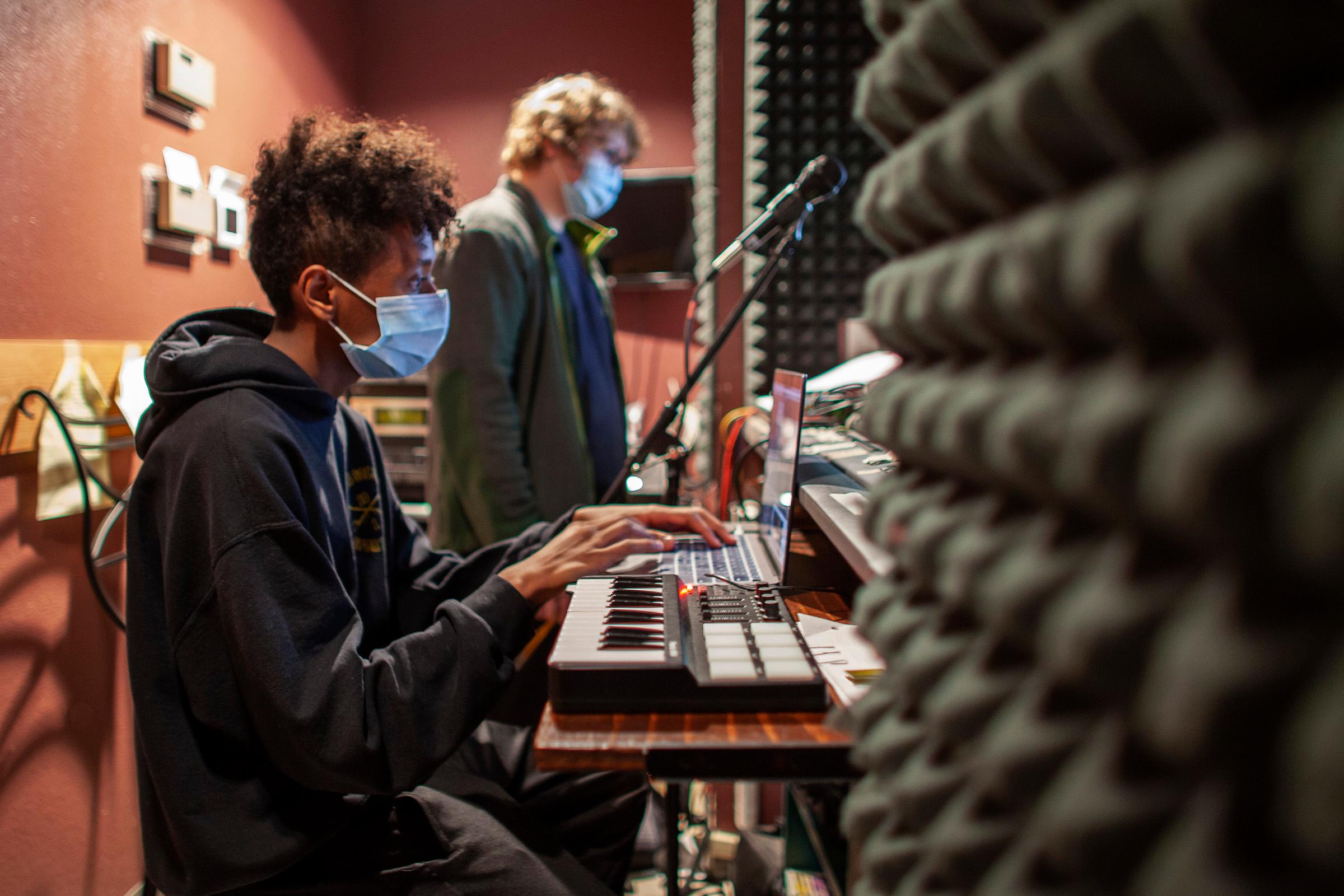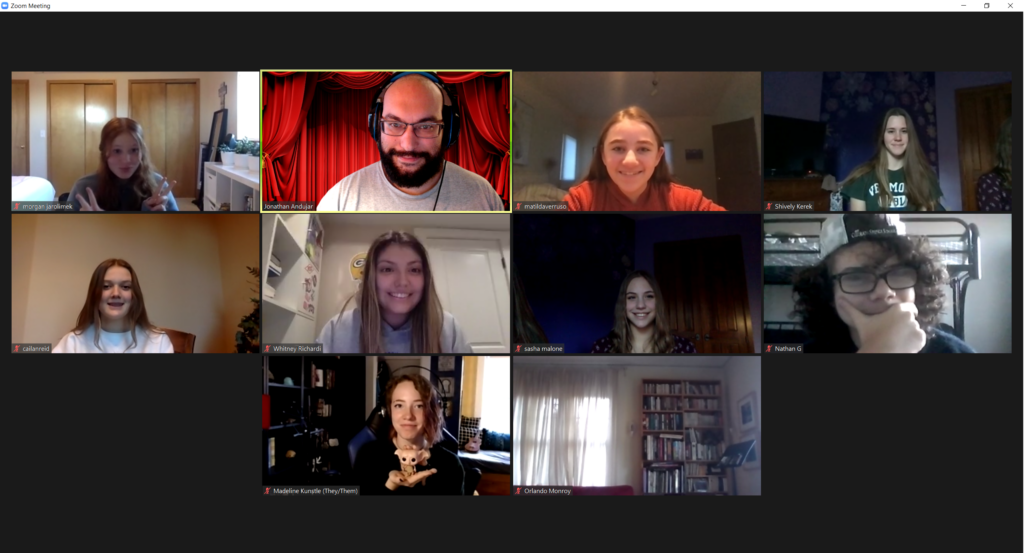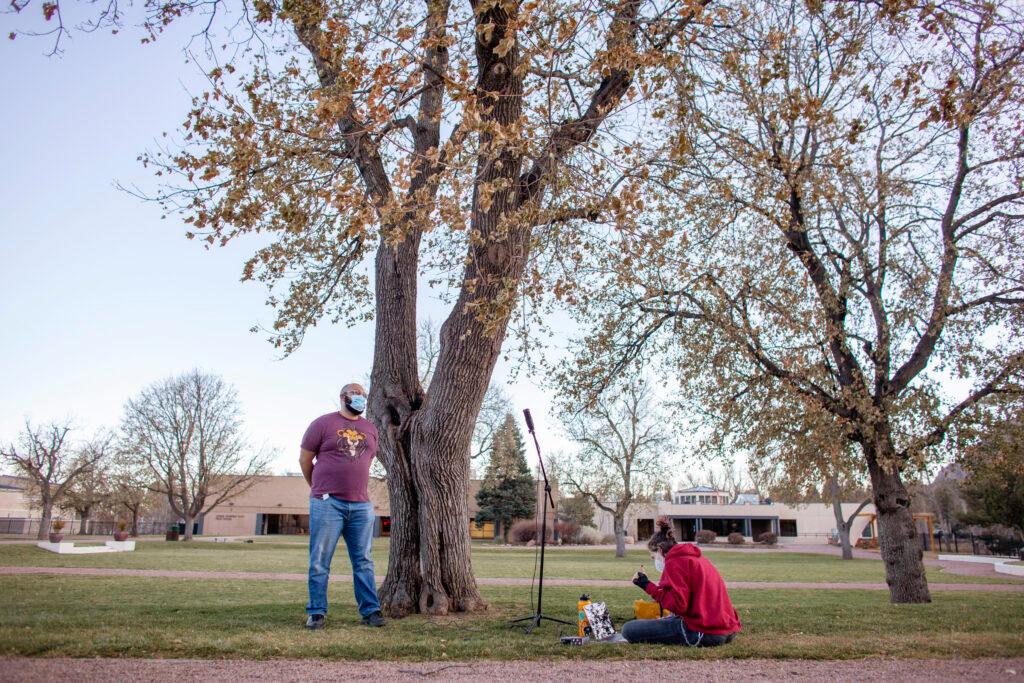
One of the casualties of the coronavirus has been the traditional school play. You know, the kind with a stage and a live, in-person audience. But instead of giving it up altogether, some drama teachers have re-imagined the annual student performance.
At the Colorado Springs School, a private K-12 college prep school, the fall production morphed into a radio drama. “Trap” is a meta mystery thriller about a school play gone awry and set (somewhat ironically for the circumstances) inside a high school auditorium.
When theater director Jonathan Andujar realized the show couldn’t happen in person on a normal stage, his mind spun through other options.
Could they perform outside? No, too cold. Could they film it? No, too much equipment, and besides, filming on location became impossible when the school went virtual.
When he finally landed on the idea of a radio play, Andujar said it felt like an “aha” moment. He had already been consulting on an audio production for the Colorado Springs Fine Arts Center, and he thought of course, why not do this with my students?
He had originally chosen the play because he loves sci-fi and mysteries. However, more than anything he loves a good plot twist. And real life in 2020 has been full of its own plot twists. Changing his approach to the annual fall play was no exception.
“A radio drama as its own art form is super exciting because the play lives in a complete world of sound,” Andujar said. “You can be in point A and point B and point C instantaneously. And you don't have to worry about the set.”

He did, however, have to worry about how he’d create characters, scenes and plot using sound alone. And that’s where sophomore student Haegen Malone came in.
Malone voice-acted several characters in the play. He also helped out with the sound effects like doors opening and footsteps on stairs. And he composed original music for the scenes. Malone refers to himself as a house musician and makes tracks at home on his computer all the time.
But this was his first time scoring a radio drama. And he happily took on the challenge.
“When I wanted to picture something sad,” he said, “I’d just grab out my keyboard and whip up something that sounds super sad. If I want to change the mood and set the scene for something more happy, I'll play something more extravagant and upbeat. And the audience is just like, ‘wow, I can already tell this is going to be like a great scene.’”
Andujar had students’ record their lines straight into their computers or iPhones at home and send them in to be woven into a final mix.
“We live in a wondrous age of technology with a bunch of teenagers and they all definitely had a phone,” he said. “So that was super handy.”
Recording her lines into a phone, and acting without costumes, sets, or props was all new and a little overwhelming for senior Whitney Richardi. Even without a stage to rehearse on, she found ways to develop her character’s persona. She plays a few characters, including a detective.
“I found myself pacing around my room or using my hands to express something,” she said. “While the audience can't see that, it really helps with character development because you're still getting those same emotions. You really have to concentrate on how you use different pitches and tones to convey to the audience what the scene is about. And that takes a lot of focus.”
And that focus has helped her evolve her craft.
“It just kind of opened up this whole new door to being an actress,” she said. “I mean, I'm a really physical person. I'm very extroverted, but the voice portion taught me a lot about just how I can utilize that to best portray my character.”
Her fingers are crossed that she’ll get to transfer those skills into a role in the spring musical. It’s her senior year, so these are her last high school plays.
It’s been bittersweet not to be able to rehearse and perform in person with her castmates, but she’s grateful there was something to do. She’s also an athlete, and her varsity volleyball season was canceled.
“It definitely made me feel just really sad about not getting those senior moments. I thought to myself, well, volleyball isn't happening, I guess the play isn't happening.” But, of course, she found out, the show must go on.

“I think one of the best parts about theater for me is just being able to go in every day and hang out with my friends, you know, in between scenes or after rehearsal. So it was definitely different. You didn't get that, you know, physical face-to-face social time.”
Malone also felt supported by his peers remotely during rehearsals.
“Whenever I have a really funny scene,” he said, “everybody is screaming or just making different sound effects into their mix.”
Andujar encouraged the students to let their guards down during virtual rehearsals because he knew it could be hard to build that rapport from afar.
“I try to make it very clear,” he said. “We can be silly. Let's do these crazy voices.”
Malone said feeling accepted in this virtual space helped him get through the semester.
“When I found out that we were going into lockdown, I was just like, Oh my gosh, I didn't know if I was able to get through it,” he said. “But when I found out I could get a part in the new upcoming radio play, I thought this is like a perfect opportunity. It just made everything feel like so much more possible.”
The final audio production of "Trap" was released to the Colorado Springs School community in December. To hear an excerpt, listen to the Colorado Matters interview by clicking on the player above.









